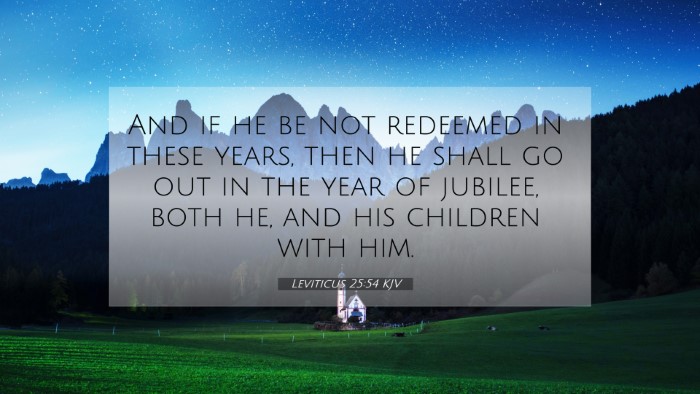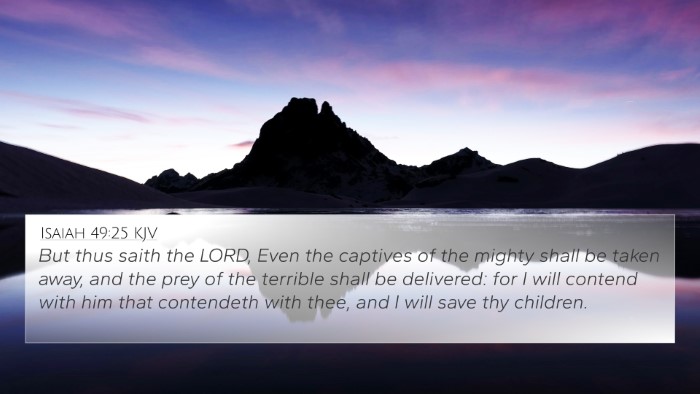Understanding Leviticus 25:54
Leviticus 25:54 states:
"And if he is not redeemed in these years, then he shall be released in the year of jubilee, he and his children with him."
This verse is a part of the legislation concerning the Year of Jubilee, a significant period of reset and restoration in the Israelite community. Commentators such as Matthew Henry, Albert Barnes, and Adam Clarke offer insights that shed light on its meaning and implications.
Verse Summary and Commentary Insights
-
Matthew Henry's Commentary:
Henry emphasizes that the laws surrounding the Year of Jubilee illustrate God's mercy and justice. The verse highlights that if an individual who has fallen into debt or slavery is not redeemed within the prescribed period, they shall go free in a divinely established year of remission. This right reinforces the importance of familial heritage and ownership.
-
Albert Barnes' Notes:
Barnes notes that this release signifies a return to original possessions and freedom. It serves not merely as an economic reset but also as a moral reminder that God desires liberty for His people. The jubilee was intended to prevent perpetual servitude and to restore social equality among the Israelites, underscoring themes of justice and grace.
-
Adam Clarke's Commentary:
Clarke discusses the importance of the jubilee as a unique theological structure that allowed individuals not to be permanently sold into hardship. This reflects God’s concern for the welfare of His people and their families, ensuring they never lose their identity or ancestral land indefinitely.
Bible Cross-References
To further understand Leviticus 25:54, consider the following related Bible verses:
- Exodus 21:2-6: Discusses the laws regarding Hebrew servants and their release.
- Leviticus 25:10: Similarly speaks of the proclamation of liberty during the jubilee year.
- Numbers 36:4: Addresses issues related to land inheritance during the jubilee.
- Isaiah 61:1: A prophetic declaration of liberation and favor from God.
- Luke 4:18-19: Jesus references Isaiah in proclaiming the year of the Lord's favor.
- Romans 8:21: Connects the themes of freedom and redemption pertaining to creation.
- 2 Corinthians 3:17: Speaks of the Spirit, where the Spirit of the Lord is, there is freedom.
- Galatians 5:1: Encourages believers to stand firm in their liberty as Christ's people.
- Hebrews 4:9-10: Relates God’s rest to the concept of ultimate liberation.
- Revelation 21:4: Envisions a future where God wipes away every tear, symbolizing freedom from pain and suffering.
Inter-Biblical Dialogues and Connections
Leviticus 25:54 serves as a point of discussion in the theological narrative regarding liberation, restoration, and familial connection in Scripture. The connections between Bible verses reveal a tapestry of God’s intention for His people, making evident the thematic Bible verse connections that highlight His continuous invitation to freedom.
Through cross-referencing biblical texts, one can see the parallel development of ideas about economic justice and personal dignity. The inter-Biblical dialogue established in texts such as Galatians and Luke continues this theme in the New Testament, indicating a fulfillment of the restorative promises laid out in the Law.
Tools for Bible Cross-Referencing
To deepen one's study and understanding of Leviticus 25:54 and its related themes, consider utilizing the following Bible reference resources:
- Bible concordance
- Bible cross-reference guide
- Cross-reference Bible study methods
- Comprehensive Bible cross-reference materials
- How to find cross-references in the Bible
Conclusion
The meaning of Leviticus 25:54 transcends its context, offering profound insights into divine justice, mercy, and the importance of family. By exploring these Bible verse parallels and utilizing cross-referencing tools, believers can glean a deeper understanding of God’s redemptive plan throughout Scripture.







